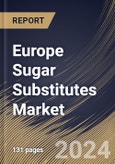Sugar substitutes also play a crucial role in the pharmaceutical and healthcare industries. Diabetic-friendly medications, supplements, and oral care products often utilize sugar substitutes to cater to patients who need to manage their sugar intake carefully. They are commonly used to produce low-fat and sugar-free yogurt variants. These substitutes provide sweetness without the caloric impact of traditional sugars, allowing consumers to enjoy a guilt-free and health-conscious yogurt experience. Natural sweeteners like stevia or artificial sweeteners such as aspartame are often employed in yogurt formulations.
Moreover, in the personal care industry, sugar substitutes find application in oral care products such as toothpaste and mouthwash. The sweetening agents enhance flavor and contribute to the consumer perception of the product as a healthier option. The primary function of sugar substitutes in oral care products is to enhance flavor without introducing actual sugars. The sweetening agents contribute to a pleasant taste, making toothpaste and mouthwash more palatable for consumers. This is especially important, as the overall sensory experience influences consumer satisfaction and encourages consistent oral hygiene practices.
Germany's food and beverage industry is diverse, offering a wide range of products to meet varied consumer preferences. These are being integrated into many products, including beverages, baked goods, dairy products, and confectionery items. A strong emphasis on product innovation characterizes Germany's food and beverage sector. Companies are developing new formulations and recipes that incorporate sugar substitutes to meet the demand for healthier options. As per the data from the report titled The Food & Beverage Industry in Germany, published by the Germany Trade and Invest (GTAI), the German food and beverage industry is the country's fourth-largest industry, with a 2020 production value of €185,3 billion. Thus, rising food and beverage industry in Europe will aid the expansion of the market in the region.
The Germany market dominated the Europe Sugar Substitutes Market, by Country in 2022, and would continue to be a dominant market till 2030; thereby, achieving a market value of $1,594.7 Million by 2030. The UK market is showcasing a CAGR of 4.7% during (2023 - 2030). Additionally, The France market would register a CAGR of 6.5% during (2023 - 2030).
Based on Application, the market is segmented into Beverages, Food (Bakery & Confectioneries, Dairy, and Others), and Health & Personal Care. Based on Type, the market is segmented into High-intensity Sweeteners, High Fructose Syrup, and Low-intensity Sweeteners. Based on countries, the market is segmented into Germany, UK, France, Russia, Spain, Italy, and Rest of Europe.
List of Key Companies Profiled
- Tate & Lyle Plc.
- Cargill, Incorporated
- Archer Daniels Midland Company
- Ingredion Incorporated
- Roquette Freres SA
- Ajinomoto Co., Inc.
- DuPont de Nemours, Inc.
- Pyure Brands, LLC
- Foodchem International Corporation
- Matsutani Chemical Industry Co., Ltd.
Market Report Segmentation
By Application (Volume, Kilo Tonnes, USD Billion, 2019-2030)- Beverages
- Food
- Bakery & Confectioneries
- Dairy
- Others
- Health & Personal Care
- High-intensity Sweeteners
- High Fructose Syrup
- Low-intensity Sweeteners
- Germany
- UK
- France
- Russia
- Spain
- Italy
- Rest of Europe
Table of Contents
Companies Mentioned
- Tate & Lyle Plc.
- Cargill, Incorporated
- Archer Daniels Midland Company
- Ingredion Incorporated
- Roquette Freres SA
- Ajinomoto Co., Inc.
- DuPont de Nemours, Inc.
- Pyure Brands, LLC
- Foodchem International Corporation
- Matsutani Chemical Industry Co., Ltd.








